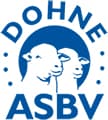Creating a competitive edge
BY MEL WILLIAMS ACM
‘We want to reward Australian growers who are using best practices in a global market where some other wool suppliers don’t have the same standard.’ Schneider Group managing director Tim Marwedel
DOHNE breeders and producers are participating in a quality assurance system that allows them to share their story – in the form of images, videos and text – all the way down the wool handling and processing supply chain to spinners and weavers.
They are some of the 1000 grower members of The Schneider Group’s paddock-to-wool Authentico Integrity Scheme.
The Authentico brand was launched in the 1990s, but it’s really taken off in the past five years as a key plank is recognising woolgrowers who no longer mules their sheep.
Authentico provides assurance for brand owners and consumers that the wool being purchased is sourced from farms applying best practices, and the Authentico Integrity Scheme is gaining traction with national and international animal welfare groups as a way to identify growers who use best practice animal welfare.
It rewards growers who follow the RSPCA’s key platforms of freedom from thirst and hunger; fear, distress and discomfort; pain, injury and disease; and expressing normal behaviour.
The Authentico Integrity Scheme makes use of existing standards and legislation honoured by growers, according to Schneider Group’s Tim Marwedel.
He said these standards are set as best practice in relation to sustainability aspects such as: animal welfare, land and pasture management, social responsibility and transport traceability.
“We want to reward Australian growers who are using best practices in a global market where some other wool suppliers don’t have the same standards.
“This will potentially give wool from Australia a more competitive edge.”
Mr Marwedel said the overriding goal of the Authentico Integrity Scheme was to recognise existing practices that improve the lives of the sheep that supply the wool of this product.
He said all Authentico wool was guaranteed to be sourced from farms who don’t mules and was fully traceable, making it ideal for Dohne wool producers, many of whom do not need to mules their sheep.
Parallel to Authentico is the international Responsible Wool Standards (RWS) system. The two schemes operate separately but Authentico recognises those growers using RWS.
“Within Authentico, we have launched an RWS farm group certification that is
assisting growers to become certified to this internationally renowned standard,” Mr Marwedel said.
“We also recognise growers adhering to the Australian Wool Exchange code of practice for wool preparation. We strongly believe that a quality product, prepared to the industry standard, is still essential and something we promote in parallel with RWS certification.”
Mr Marwedel said a key benefit for Dohne and other wool producers from using Authentico was the ability to promote their own brand and to present this to a range of international customers.
Authentico wool tops are manufactured in Schneider Group processing facilities in Italy, Egypt, Argentina and China.
He said Schnieder branded Authentico wool up to the topmaking stage and had many spinner and weaver clients who actively soughtout the brand.
“To secure value for all Authentico stakeholders, we partnered with Textile Genesis platform so that our program offers an easy traceability that is user friendly, reliable, open and third party verified,” he said.
“Authentico growers register via our own dedicated member platform at no cost. This gives them visibility and access to a number of benefits and at the same time is allowing us to forecast and analyse wool supply and manage our network.”











 Facebook
Facebook YouTube
YouTube Instagram
Instagram